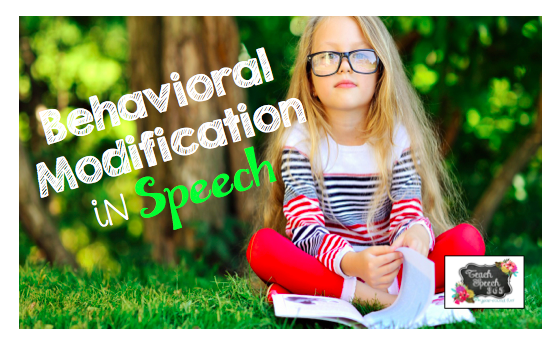Behavioral Modification in Speech

First things first: I’m not trained in behavioral modification. I’m not an ABA therapist or a psychologist, by any means. I’m bringing you this post based on what I’ve learned in my 5+ years experience as a school based/private practice SLP.
Behavioral modification. It’s not something we learn about in grad school. This is one of those skills you have to pick up and learn on the fly once you’re thrust into the job. For me, learning how to manage small groups of students and balance differing goals/needs/personalities was a bit of a challenge in the beginning of my career. It still can be a challenge!
Like adults, kids have “off days.” You may be dealing with children with Autism, who can have their own set of behaviors, depending on the situation. There may be lots of reasons that a child is demonstrating behaviors in speech.
Here are my tips for dealing with behaviors that might hinder success during a therapy session:
1. For some kids, they might just need to take a little break. We are a responsive classroom school, so this just means I might say “take a break” to a student and they sit go to the other side of the room and sit for a minute or two before rejoining the group.
2. Some of my kids respond well to a simple point system to earn a reward at the end of the session. For these kids, I draw 5 boxes and they earn stars throughout the session. If they get 5 before the end, they get 2-3 minutes of a video or iPad time. For other kids, they might utilize a token system that helps keep behaviors in check.
3. Some kids might demonstrate behaviors when a task is particularly challenging for them. In these cases, I spend extra time breaking down the task and providing positive reinforcement which usually decreases the behavior.
4. Some kids respond well to “being the teacher.” Turn the situation around and let them “teach” you. They won’t realize they’re still working on speech/language skills!
5. If behaviors become aggressive or truly start to derail the session, there is no harm in stopping. I’ve had to do this before. I usually will seek help from another adult in the classroom first, but sometimes you might do everything you can and nothing will seem to help. In these cases, I document and might try a different activity the next session.
Along with being SLPs, we have to put on many different hats along the course of our days. I hope these tips help if you’ve been experiencing behaviors during speech!
